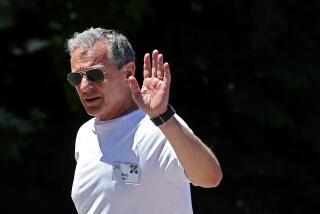McDonnell Douglas Reassigns 2 Top Executives
- Share via
James E. Worsham, the executive widely credited with the historic turnaround at Douglas Aircraft, was reassigned Thursday in a McDonnell Douglas management shuffle that returned him to closer control of the Long Beach aircraft operation, which has suffered production problems.
McDonnell Douglas announced that Worsham would give up his title of corporate vice president-aerospace group executive and “return to his previous position as president” of Douglas Aircraft.
William T. Gross, current Douglas president, was named a senior vice president. A company spokesman said the reassignments do not significantly change the two executives’ responsibilities or their lines of management reporting.
Worsham’s former position was eliminated, as was another group executive position in McDonnell Douglas’ corporate office. Robert C. Little, who had the same title as Worsham, was made vice chairman for government business.
“I am sure you are seeing John McDonnell putting his preferred organization in place,” said Don Hanson, a Douglas Aircraft spokesman. John McDonnell became chairman and chief executive of the company March 2.
Some analysts said the reassignment smacked of a demotion for both Worsham and Gross. John Simon, aerospace analyst at Seidler Amdec Securities, noted that most corporations that eliminate top positions “usually let the executive retire gracefully.”
But other analysts said they believe the move makes sense because it puts Worsham, 63, back in a job that will maximize his effectiveness.
“That company is way out on the limb in a number of programs and the situation could turn negative if Worsham isn’t there to shepherd it through,” said Paul Nisbet, aerospace analyst at Prudential-Bache Securities. “He is too valuable to promote.”
Joseph Campbell, analyst at Paine Webber, said, “You can’t both manage the company and sell airplanes. Worsham is Mr. Sell-the-Airplanes. These guys who sell airplanes are tremendously energetic and very smart.”
But Campbell and others noted that Douglas is experiencing significant production problems on its MD-80 aircraft line, resulting in significant delivery delays that have caused problems with some customers.
“The fourth quarter results show not enough MD-80s are coming off the line,” said Campbell.
Indeed, the company has had late deliveries for a number of customers and it appears that a significant bottleneck has occurred in its final assembly area.
“Aircraft deliveries are pretty seriously delayed,” said Louis L. Gonda, executive vice president at International Lease Finance of Beverly Hills. “They matter of factly dropped on us a two-month delay on one of our aircraft.
“It is hurting us tremendously and hurting our customers tremendously,” he added.
American Airlines, a major Douglas customer, recently blamed late deliveries in part for a decision to cancel the opening of a large flight hub operation in Seattle, according to a letter that was sent to Seattle city officials and later published in a trade journal.
Hanson said the reassignments are not related to the production delays. He said the company has solved its production problems, noting that a revised delivery schedule was negotiated and signed with customers in December. In addition, a labor contract with the Douglas unions was signed in January.
“The problems have been through the line,” he said. “There were problems of different kinds in different places, which was one reason it was difficult to get under control.”
The corporation did not address the Douglas problems in its announcement, but said, “This revision of our management structure is designed to maximize the effectiveness of the people involved, strengthen the efficiency and innovativeness of the organization, and help us prepare for the many challenges that must be met if we are to remain a world leader in aerospace and information systems into the 21st Century.”
More to Read
Inside the business of entertainment
The Wide Shot brings you news, analysis and insights on everything from streaming wars to production — and what it all means for the future.
You may occasionally receive promotional content from the Los Angeles Times.











